views
Do your best to accept what’s happened.

Heartbreak is incredibly painful, but it’s important to acknowledge it. Instead of trying to numb your pain, ignore your feelings, or deny what happened, be honest with yourself. You’ve just gone through an extremely tough experience! It will be really difficult at first, but ultimately you’ll heal faster if you admit that something bad has happened and allow yourself to feel awful about it. Try not to cling to unrealistic ideas about what could happen, such as getting back together with your ex after a bad breakup. False hope may help you feel better temporarily, but it will ultimately lead to more disappointment and heartbreak. If you need to, take a couple of days off from school or work. While distracting yourself and keeping busy can be helpful, it’s also important to give yourself a little space and time to rest and feel your grief.
Give yourself permission to feel sad.
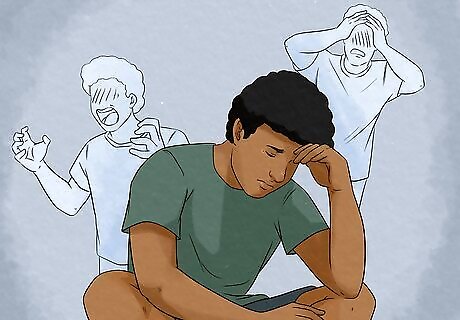
It’s also okay to feel angry, confused, or numb. It’s normal to feel all kinds of difficult emotions after a heartbreak. You’ve suffered a huge loss, and grieving is part of the healing process. Instead of trying to avoid those feelings, allow yourself to feel them. Tell yourself that you need time to mourn. Think of your emotions as waves in a troubled ocean. Instead of trying to fight against them or go around them, just let yourself ride the waves. It may not feel like it now, but they will eventually get calmer! Don’t try to numb yourself to the pain or swear off relationships forever. Instead, acknowledge that what you’re feeling is temporary, and things will get better.
Cry it out if you need to.

Crying is a good and healthy way to express your feelings. If you feel like crying, let it out. Find a place where you can be alone, or with a good friend, and let the tears flow. It'll be over more quickly than you think, and you'll feel a little better after getting those emotions out. If you don’t want to cry in front of other people or in public, try taking a few slow, deep breaths in through your nose and out through your mouth to help you calm down. Go someplace where you can have some privacy, like a bathroom, and let it out.
Challenge negative thoughts.

Dwelling on blame or negative self-talk can make heartbreak worse. It’s normal to have some dark thoughts when you’ve just gone through a terrible experience. But letting those thoughts take over your mind will make it harder to heal and move on. Next time you find yourself thinking something negative, notice the thought and gently challenge it with a more positive or realistic one. For example, you may find yourself thinking things like, “This is all my fault,” or “I’ll never find love again.” Respond to those thoughts with things like, “There were a lot of reasons it didn’t work out. My ex and I both played a part in it.” Or, “I’ve been in relationships before, and there’s no reason it won’t happen again. I learned things from this one that will help me make the next one even better.” It’s easier to deal with negative thoughts if you notice them when they happen. Practice mindful meditation to help you become more aware of your thoughts and the feelings they trigger. If you’re not sure how to get started, try signing up for a meditation course.
Remind yourself of the reasons things didn’t work out.

If your heartbreak is because of a breakup, think about what went wrong. Remember, there is always a reason. Recognizing what was bad about your relationship will help put things in perspective. It will also help you learn and grow so you can build better relationships in the future! Also think about what you liked in the relationship, and what things you would want to look for in a future partner. For instance, if you find yourself pining for your ex, think about how you often you argued, or the fact that they weren’t always good at being there for you when you needed them. Remembering the bad things doesn’t mean you have to ignore the good parts! In fact, accepting how much you loved the person is an important part of helping yourself heal. Just try to keep your perspective balanced and realistic. For example, remind yourself how annoying it was that they never washed the dishes, but also remember how much you enjoyed their sense of humor.
Practice positive self-talk.

Think about your strengths and feel proud of them. Acknowledging that something bad happened to you, and realizing that you are strong enough to deal with it, is a key part of getting over your heartbreak. Be kind and gentle with yourself, and talk to yourself the same way you would to a good friend going through something tough. Make a list of your strengths. Remind yourself of your accomplishments, and the good qualities you have. The act of writing them out can remind you of them, and you can also read the list whenever you feel down and need a boost. Say things to yourself like, “Hey, you’re dealing with something incredibly tough right now, but I believe in you. You can get through this!” Or, “You deserve to be happy, and you’re worthy of love.”
Reach out to a friend or loved one.

You are not alone in the world. Look for a trusted friend, a close relative, or a mentor, and tell them how you feel. Sometimes just getting your feelings off your chest can help you work through them. Additionally, you never know what help other people can give, whether it's good advice or just a shoulder to cry on. If you don’t have anyone to turn to, look for a support group online. There are tons of heartbreak groups out there for people who are going through—or have already been through—similar things. You can also call or text a crisis line, such as the Crisis Text Line. To text the Crisis Text line, text “HOME” to 741741. Even just venting to a stranger for a few minutes can help you feel better—plus, they can direct you to other resources that might help.
Remember to practice self-care.
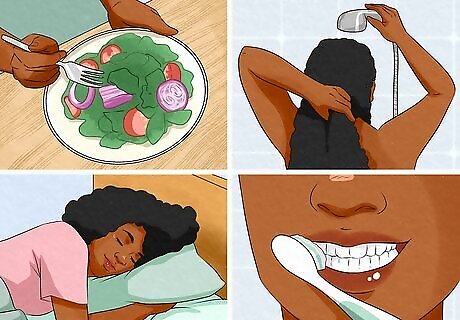
Don’t forget the basics, like eating well and sleeping. When you’re heartbroken, it can be hard to stay on top of day-to-day things like your health, hygiene, and everyday chores. However, doing those things can make a big difference in how you feel. Set a goal of taking care of these basic things every day. If you have to, write reminders for yourself, like “Take a shower!” or “Pay your electric bill tonight.” If you’re really struggling with motivation, try starting with one simple thing, like brushing your teeth or putting on clean clothes. Then, see if you feel up to doing something else, like eating a healthy snack. Take it one thing at a time!
Do stress-relieving activities.
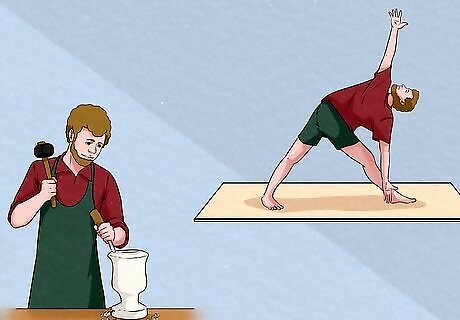
Make time for things you enjoy and find relaxing. Having a little fun will help relieve the stress of heartbreak. It will also help you remember the things you value outside of your relationship, or whatever may have caused your heartbreak. For example, you might: Work on a hobby or creative project Go for a walk Watch a movie or TV show you enjoy Listen to relaxing music Spend time with friends Meditate or do light stretches, yoga, or breathing exercises
Relieve stress with exercise.
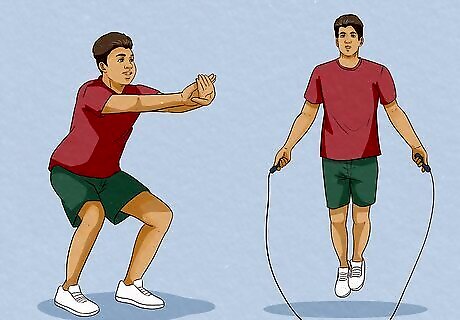
Exercise releases natural feel-good chemicals in your brain. Plus, it can boost your confidence and help you feel more in-control. Next time you feel down, go for a jog, hop on your bike, or exercise along with your favorite workout video. You don't need a full workout. Something as simple as a 10- to 15-minute walk can help you feel better. Even work that doesn't feel like exercise, like weeding a garden or taking a walk outside, gets you some fresh air while you move. The most important thing is that you stay consistent in what you do. If you have trouble motivating yourself, ask a friend to join you, or combine exercise with something else you enjoy. For instance, you could work out while watching a favorite TV show or break a sweat dancing to upbeat music.
Get rid of reminders of your heartbreak.
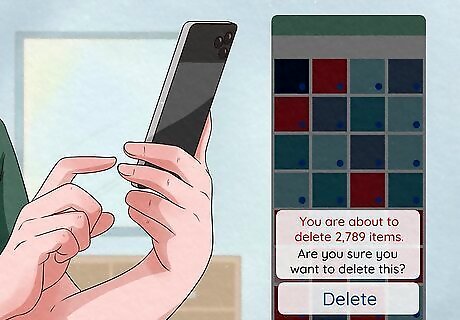
It’s hard to move on with constant reminders around you. Put away pictures of your ex and any gifts they gave you—at least for now. For a while, you might also want to avoid activities or places that remind you of them, such as listening to an album you both loved or going to your regular date night restaurant. If you have photos or videos on your phone that trigger painful feelings or memories, delete them or move them to a location you won’t be as tempted to look at. This doesn’t mean you have to throw away or destroy things that remind you of your ex, or keep avoiding your favorite places forever. Just give yourself some time to process your feelings away from those reminders. If you have things that belong to your ex, consider mailing the items to them. Or, you can arrange a time for them to pick the items up (just keep any contact to a minimum).
Cut off contact with the person who broke your heart.
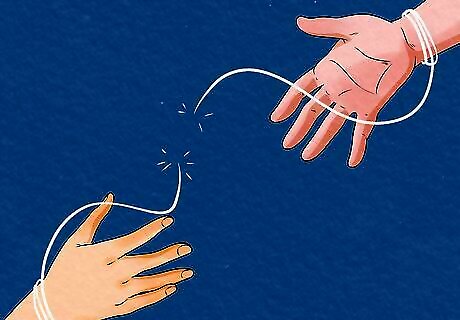
You need time and space to grieve. Keeping in contact with them will make you feel even worse than you already do. As hard as it may be, do your best not to reach out to them at all unless it’s absolutely necessary. Unfollow them on social media, and take their number out of your contacts if you find it too tempting to call or text. You may be able to have a friendship with them in the future, but it’s important to get some distance and time to heal before you try that. Be especially careful not to contact your ex late at night or when you’ve been drinking. It’s not likely to help anything, and you’ll probably feel embarrassed or upset about it the next day. If there’s something you really want to say to them, write it down in a journal or a text document, but don’t send it. You can even destroy what you wrote after the fact. Ask your friends to help. Say something like, “Hey, if I start asking what my ex is up to, just remind me that I need space.” Or, you can ask them to distract you by changing the subject. Reader Poll: We asked 404 wikiHow readers, and 54% of them agreed that the best way to handle social media after a breakup is by taking a break for a couple of weeks. [Take Poll]
Try some fun new activities.

Doing new things can enrich your life and boost your confidence. It’ll also help distract you from your heartbreak. Sign up for a class, pick up a new hobby, or join a gaming group or club that meets every week. Make a list of things you’ve always wanted to learn or do. Crossing things off your list will give you a sense of accomplishment and help you feel more positive about the future. Trying new activities is also a great way to meet new friends and grow your support network!
Focus on helping others.

It feels good to be compassionate. Plus, it can help take your mind off your own pain. Ask your friends about what is going on in their lives, or talk to your family about how they are doing. Ask if there’s anything you can do to help, whether it’s running errands, helping them fix something, or just being a sympathetic listener. You don't have to limit yourself to helping people you know. Volunteer at a soup kitchen or shelter and focus on bettering the lives of others. These kinds of activities can help give your life a sense of purpose and meaning.
Meet new people.

If you feel ready, you can even try dating again. Losing someone does not mean you are unlovable or can never love again. But it’s also a good idea to take things slow while you’re still recovering. Start by making connections without any expectations of romance—just focus on making friends. From there, you might find that new relationships develop a lot more easily and naturally! For example, you might meet new people by joining a club or a volunteer group. These are good ways to connect with others who share similar values and interests. Be careful not to rush into a rebound relationship, but be open to the possibility of a new romance. Be patient and trust your instincts.
Be patient with yourself.
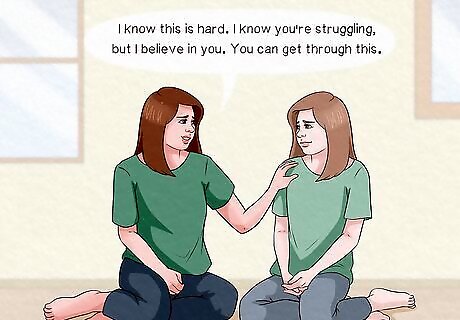
Everyone grieves on their own schedule. Healing is complicated. While you’re on the way to recovery, you may come up against some days that are harder than others. This is frustrating, but it’s totally normal. Don't beat yourself up over feeling sad when you thought you were recovering. Just recognize that you’re having one of your rough days, and be extra kind to yourself until you feel a bit better. One study found that it takes 3 months on average to start feeling a lot better after a breakup. However, don’t be too worried if it takes you longer than that—every person is different, and so is every heartbreak. Occasionally fantasizing about your ex is normal. Rather than trying to push these thoughts away, accept them, and then look for something else to think about instead.
See a counselor if you think you’re depressed.

Sometimes you need a little extra help to mend a broken heart. It’s completely normal to feel sad after a heartbreak. However, if you’re concerned about how long it’s taking to feel better, or if your feelings are so overwhelming that they’re interfering with your everyday life, reach out to your doctor or a counselor. These could be signs that your grief has turned into depression. A counselor may recommend talk therapy, cognitive behavioral therapy (a type of therapy that focuses on recognizing and changing unhealthy thoughts and behaviors), or a combination of therapy and medications to help manage your depression. Depression doesn’t always feel like sadness. You might feel numb, exhausted, irritable, unmotivated, confused, or angry. If you have thoughts of harming yourself or others, call emergency services or contact a crisis line right away. In the U.S., you can also text “HOME” to the Crisis Text Line at 741741.




















Comments
0 comment